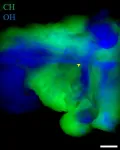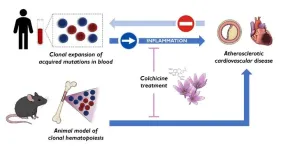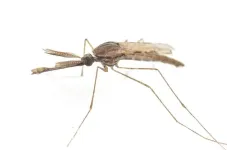(Press-News.org) Researchers from the University of Cincinnati College of Medicine and Cincinnati Children’s Hospital have found a new method to increase both speed and success rates in drug discovery.
The study, published Aug. 30 in the journal Science Advances, offers renewed promise when it comes to discovering new drugs.
“The hope is we can speed up the timeline of drug discovery from years to months,” said Alex Thorman, PhD, co-first author and a postdoctoral fellow in the Department of Environmental and Public Health Sciences in the College of Medicine.
Researchers combined two approaches for screening potential new drugs. First, they used a database from the Library of Integrated Network-based Cellular Signatures (LINCS) to screen tens of thousands of small molecules with potential therapeutic effects simultaneously. Then they combined the search with targeted docking simulations used to model the interaction between small molecules and their protein targets to find compounds of interest. That sped up the timing of the work from months to minutes — taking weeks of work required for initial screening down to an afternoon.
Thorman said this faster screening method for compounds that could become drugs accelerates the drug research process. But it’s not only speed that is crucial.
He added that this newer approach is more efficient at identifying potentially effective compounds.
“And the accuracy will only improve, hopefully offering new hope to many people who have diseases with no known cure, including those with cancer,” Thorman said.
It can also create more targeted treatment options in precision medicine, an innovative approach to tailoring disease prevention and treatment that takes into account differences in people's genes, environments and lifestyles.
“An accelerated drug discovery process also could be a game changer in the ability to respond to public health crises, such as the COVID-19 pandemic,” said Thorman. “The timeline for developing effective drugs could be expedited.”
The other co-first authors were Jim Reigle, PhD, a postdoctoral fellow at Cincinnati Children’s Hospital, and Somchai Chutipongtanate, PhD, an associate professor in the Department of Environmental and Public Health Sciences in the College of Medicine.
The corresponding authors of the study were Jarek Meller, PhD, a professor of biostatistics, health informatics and data sciences in the College of Medicine, and Andrew Herr, PhD, a professor of immunobiology in the Department of Pediatrics in the College of Medicine.
Other co-investigators included Mario Medvedovic, PhD, professor and director of the Center for Biostatistics and Bioinformatics Services in the College of Medicine, and David Hildeman, PhD, professor of immunobiology in the College of Medicine. Both Herr and Hildeman have faculty research labs at Cincinnati Children’s Hospital.
This research was funded in part by grants from the National Institutes of Health, a Department of Veterans Affairs merit award, a UC Cancer Center Pilot Project Award and a Cincinnati Children’s Hospital Innovation Fund award.
Those involved in the research are also co-inventors on three U.S. patents that are related to their work and have been filed by Cincinnati Children’s Hospital.
END
Study combines data, molecular simulations to accelerate drug discovery
New research involving UC College of Medicine may lead to finding effective therapies faster
2024-08-30
ELSE PRESS RELEASES FROM THIS DATE:
NCT/UCC Dresden: Millions in funding from the Chan Zuckerberg Initiative for state-of-the-art imaging to accurately detect minute tumors
2024-08-30
The imaging techniques currently used in biological research cannot penetrate into deeper tissue layers. In cancer treatment, this means that remnants of tumors or individual cancer cells at tumor margins and in lymph nodes are not visible. Doctors performing surgery are therefore repeatedly faced with the difficult question of whether all of the affected tissue has actually been removed. For the patient's quality of life, however, the complete removal of the tumor is just as essential as the preservation of healthy tissue ...
CNIC scientists discover a new cardiovascular risk factor and identify a drug able to reduce its effects
2024-08-30
To the known risk factors for cardiovascular disease—high blood pressure, high cholesterol, diabetes, overweight and obesity, smoking, and physical inactivity—a new one has to be added: clonal hematopoiesis. This condition is triggered by acquired mutations in blood stem cells and was already known to be associated with an elevated cardiovascular risk. However, until now it was uncertain if clonal hematopoiesis was a cause or consequence of cardiovascular disease. Now, a new study published in Nature Medicine and carried out by researchers at the Centro Nacional de Investigaciones Cardiovasculares (CNIC) resolves this critical debate ...
When the heat makes you disoriented
2024-08-30
Climate change is affecting ecosystems in many different ways. One of its consequences are increasingly longer and more intense periods of heat, which affect essential natural processes – such as pollination. A team of researchers from Julius-Maximilians-Universität Würzburg (JMU) has now investigated in more detail how heat affects one particular player in these processes: The bumblebee.
"Bumblebees are important pollinators in natural and agricultural systems. They therefore ...
Showcasing latest AI updates, Insilico Medicine attends 2024 EFMC International Symposium on Medicinal Chemistry
2024-08-30
Attracting around 1,000 participants from industry and academia, the XXVIII EFMC International Symposium on Medicinal Chemistry (EFMC-ISMC) is supposed to take place in Rome, Italy from September 1-5, 2024. After the generative AI updates recently announced on the IMGAIA webinar, Insilico Medicine will be sharing more innovative details while exploring collaboration chances at Booth #50.
EFMC-ISMC is a key symposium in the field of medicinal chemistry and drug discovery, and the symposium this year features ...
Novel chemical tool aims to streamline drug-making process
2024-08-30
COLUMBUS, Ohio – The invention of a tool capable of unlocking previously impossible organic chemical reactions has opened new pathways in the pharmaceutical industry to create effective drugs more quickly.
Traditionally, most drugs are assembled using molecular fragments called alkyl building blocks, organic compounds that have a wide variety of applications. However, because of how difficult it can be to combine different types of these compounds into something new, this method of creation ...
New discoveries about how mosquitoes mate may help the fight against malaria
2024-08-30
Link to Google Drive folder containing images with caption and credit information:
https://drive.google.com/drive/folders/1UM9rl47Xd_Bs-ov0HpVwC-rtUDonM3oJ?usp=sharing
Post-embargo link to release:
https://www.washington.edu/news/2024/08/30/mosquito-swarm/
Embargoed by Current Biology
For public release at 11 a.m. U.S. Eastern Time (8 a.m. U.S. Pacific Time) on Friday, Aug. 30, 2024
A high-pitched buzzing sound in your ear is an unmistakable sign that a female mosquito is out on the hunt — for they, not males, drink blood. Hearing ...
It’s worth challenging that troubling medical bill, study finds
2024-08-30
Many people who receive a problematic medical bill don’t challenge it – but new USC Schaeffer Center research shows they are likely missing out on a chance for financial relief.
About 1 in 5 people said they recently received a medical bill they disagreed with or couldn’t afford, including 61.5% who said they contacted a billing office to address their concern, according to survey results published Aug. 30 in JAMA Health Forum. Most who reached out said they received some form of payment help or had their bill corrected.
It’s ...
New study finds Medicare Advantage (MA) enrollees experience similar declines in frailty over one year compared with Traditional Medicare (TM) enrollees
2024-08-30
Enrollment in Medicare Advantage (MA) plans is not associated with altered frailty trajectories compared with enrollment in Traditional Medicare (TM), according to research published today in JAMA Network Open.
In the article Frailty in Medicare Advantage Beneficiaries and Traditional Medicare Beneficiaries, lead author Sandra M. Shi, MD, MPH and colleagues suggest that more work is needed to better understand the health services needs of older adults with frailty.
“A growing proportion of the population is enrolling in Medicare Advantage (MA), which typically ...
Autoimmune sequelae after Delta or Omicron variant SARS-CoV-2 infection in a highly vaccinated cohort
2024-08-30
About The Study: This cohort study observed no significantly elevated long-term risk of autoimmune sequelae after SARS-CoV-2 Delta and Omicron BA.1 or BA.2 variant infection, except for a modestly increased risk of inflammatory bowel disease and bullous skin disorders in the hospitalized subgroup during the predominance of the Omicron variant. Booster vaccination appeared to mitigate the risk of long-term autoimmune sequelae.
Corresponding Author: To contact the corresponding author, Liang ...
Racial disparities in cancer stage at diagnosis and survival for adolescents and young adults
2024-08-30
About The Study: The findings of this study suggest that racial disparities in cancer stage at diagnosis and survival exist among adolescent and young adult patients when disaggregated according to federal guidelines, which has health policy and funding implications. These results support the need for tailored interventions and informed public policy to achieve cancer care equity for all races.
Corresponding Author: To contact the corresponding author, Kekoa Taparra, MD, PhD, email ktaparra@stanford.edu.
To ...
LAST 30 PRESS RELEASES:
ASU researchers to lead AAAS panel on water insecurity in the United States
ASU professor Anne Stone to present at AAAS Conference in Phoenix on ancient origins of modern disease
Proposals for exploring viruses and skin as the next experimental quantum frontiers share US$30,000 science award
ASU researchers showcase scalable tech solutions for older adults living alone with cognitive decline at AAAS 2026
Scientists identify smooth regional trends in fruit fly survival strategies
Antipathy toward snakes? Your parents likely talked you into that at an early age
Sylvester Cancer Tip Sheet for Feb. 2026
Online exposure to medical misinformation concentrated among older adults
Telehealth improves access to genetic services for adult survivors of childhood cancers
Outdated mortality benchmarks risk missing early signs of famine and delay recognizing mass starvation
Newly discovered bacterium converts carbon dioxide into chemicals using electricity
Flipping and reversing mini-proteins could improve disease treatment
Scientists reveal major hidden source of atmospheric nitrogen pollution in fragile lake basin
Biochar emerges as a powerful tool for soil carbon neutrality and climate mitigation
Tiny cell messengers show big promise for safer protein and gene delivery
AMS releases statement regarding the decision to rescind EPA’s 2009 Endangerment Finding
Parents’ alcohol and drug use influences their children’s consumption, research shows
Modular assembly of chiral nitrogen-bridged rings achieved by palladium-catalyzed diastereoselective and enantioselective cascade cyclization reactions
Promoting civic engagement
AMS Science Preview: Hurricane slowdown, school snow days
Deforestation in the Amazon raises the surface temperature by 3 °C during the dry season
Model more accurately maps the impact of frost on corn crops
How did humans develop sharp vision? Lab-grown retinas show likely answer
Sour grapes? Taste, experience of sour foods depends on individual consumer
At AAAS, professor Krystal Tsosie argues the future of science must be Indigenous-led
From the lab to the living room: Decoding Parkinson’s patients movements in the real world
Research advances in porous materials, as highlighted in the 2025 Nobel Prize in Chemistry
Sally C. Morton, executive vice president of ASU Knowledge Enterprise, presents a bold and practical framework for moving research from discovery to real-world impact
Biochemical parameters in patients with diabetic nephropathy versus individuals with diabetes alone, non-diabetic nephropathy, and healthy controls
Muscular strength and mortality in women ages 63 to 99
[Press-News.org] Study combines data, molecular simulations to accelerate drug discoveryNew research involving UC College of Medicine may lead to finding effective therapies faster



